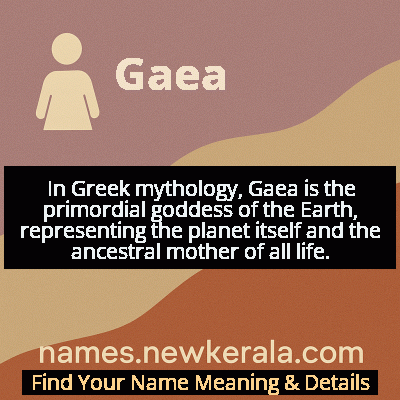Gaea Name Meaning & Details
Origin, Popularity, Numerology Analysis & Name Meaning of Gaea
Discover the origin, meaning, and cultural significance of the name GAEA. Delve into its historical roots and explore the lasting impact it has had on communities and traditions.
Name
Gaea
Gender
Female
Origin
Greek
Lucky Number
5
Meaning of the Name - Gaea
In Greek mythology, Gaea is the primordial goddess of the Earth, representing the planet itself and the ancestral mother of all life.
Gaea - Complete Numerology Analysis
Your Numerology Number
Based on Pythagorean Numerology System
Ruling Planet
Mercury
Positive Nature
Adventurous, dynamic, curious, and social.
Negative Traits
Restless, impatient, inconsistent, prone to indulgence.
Lucky Colours
Green, white.
Lucky Days
Wednesday.
Lucky Stones
Emerald.
Harmony Numbers
1, 3, 9.
Best Suited Professions
Sales, marketing, travel, entertainment.
What People Like About You
Versatility, charisma, adventurous spirit.
Famous People Named Gaea
Gaea (Mythological)
Primordial Goddess
Mother of Titans, Giants, and all earthly life; personification of Earth itself
Gaea Girls (Performance Group)
Contemporary Dance Troupe
Modern dance collective exploring themes of nature, femininity, and environmental consciousness
Gaea Star Crystal
Musical Artist
New Age musician creating ambient music inspired by nature and spiritual themes
Name Variations & International Equivalents
Click on blue names to explore their detailed meanings. Gray names with will be available soon.
Cultural & Historical Significance
In contemporary culture, Gaea's influence extends to environmental philosophy through the Gaia Hypothesis proposed by James Lovelock, which suggests that the Earth functions as a single self-regulating system. This scientific theory revitalized the ancient concept of Earth as a living entity, making Gaea relevant to modern ecological discussions. The name has become symbolic of environmental activism, sustainable living, and the recognition of humanity's interconnectedness with the natural world. Various eco-spiritual movements and feminist theology have embraced Gaea as an archetype of feminine power and ecological wisdom, positioning her as a counterbalance to patriarchal religious traditions.
Extended Personality Analysis
Individuals named Gaea are often perceived as deeply connected to nature, nurturing, and possessing strong maternal instincts. They tend to exhibit remarkable stability and resilience, much like the earth itself, showing patience and endurance through life's challenges. These individuals often serve as the foundation in their relationships and communities, providing support and wisdom to others. Their connection to the name's mythological roots often manifests as environmental consciousness and a protective attitude toward the natural world. Gaea-named individuals typically display strong intuition and practical wisdom, combining emotional depth with grounded reasoning.
People with this name often demonstrate a natural ability to nurture growth in others, whether through mentoring, teaching, or caregiving roles. They possess an innate understanding of cycles and rhythms, showing adaptability to changing circumstances while maintaining their core values. While generally peaceful and harmonious, they can display formidable strength when their principles or loved ones are threatened. This reflects the earth's dual nature—both life-giving and powerful enough to reshape landscapes through earthquakes and volcanic activity. Their personality often includes a deep appreciation for beauty, particularly natural beauty, and they may excel in creative fields that allow them to express their connection to the earth and its cycles.
Modern Usage & Popularity
The name Gaea (and its more common spelling Gaia) has experienced a notable resurgence in recent decades, particularly among parents seeking mythological, nature-inspired names with deep ecological significance. While still relatively uncommon compared to mainstream names, its usage has grown steadily since the 1970s, coinciding with the rise of environmental movements, feminist spirituality, and New Age philosophy. The name is particularly popular in environmentally conscious communities, among families with Greek heritage, and in academic circles familiar with classical mythology. According to naming statistics, Gaia ranks within the top 1000 names in several European countries, including Italy, Portugal, and Spain, while Gaea remains more rare but appreciated for its authentic ancient Greek spelling. The name's appeal lies in its combination of classical roots, feminist undertones, and contemporary environmental relevance, making it a powerful choice that bridges ancient wisdom with modern values about planetary stewardship and gender equality.
Symbolic & Spiritual Meanings
Symbolically, Gaea represents the interconnectedness of all life, fertility, abundance, and the cyclical nature of existence. She embodies the concept of the Earth as a living, breathing entity—an idea that gained scientific traction with James Lovelock's Gaia Hypothesis, which proposes that the Earth functions as a self-regulating system. The name carries profound connotations of unconditional nurturing, the ultimate source of all life, and the fundamental provider of sustenance and shelter. Metaphorically, Gaea symbolizes grounding, stability, and the foundation upon which civilizations are built, representing both physical earth and emotional rootedness. She embodies the balance between creation and destruction, as the earth both gives life and reclaims it through natural processes. In psychological terms, the Gaea archetype represents the Great Mother—the source of comfort, nourishment, primal wisdom, and unconditional love. The name also carries strong ecological symbolism, representing environmental stewardship, sustainability, and humanity's responsibility toward planetary care in an age of climate crisis and ecological awareness.

